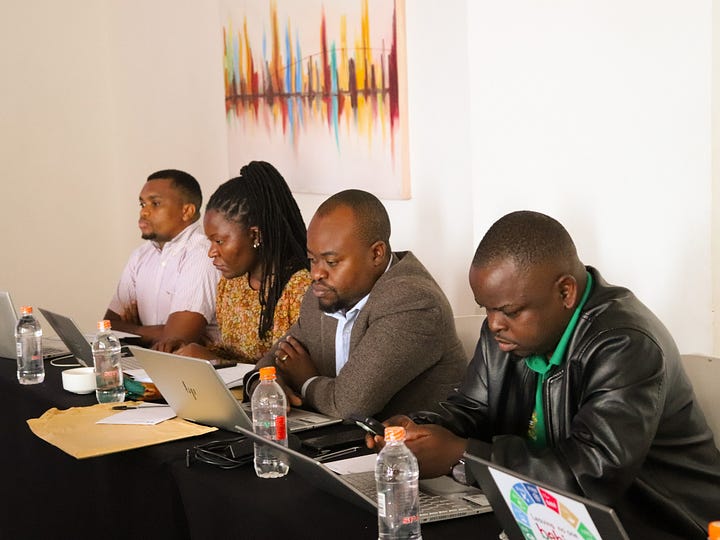MALAWI REFINES BIODIVERSITY RESOURCE MOBILIZATION TARGETS
BIOFIN supports refining Malawi's National Biodiversity Strategy and Action Plan (NBSAP) resource mobilization targets to align with the Global Biodiversity Framework.
Davies Chogawana, an environmentalist stressing a point during a meeting to refine Malawi’s National Biodiversity Strategy and Action Plan (NBSAP) resource mobilization targets.
Blantyre (Malawi) - Biodiversity experts from various sectors led by the Biodiversity Division under the Environmental Affairs Department in the Ministry of Natural Resources and Climate Change in Malawi have reviewed the country’s National Biodiversity Strategy and Action Plan (NBSAP) targets related to resource mobilization to align with the Global Biodiversity Framework.
Malawi as a party to Convention on Biodiversity (CBD) is expected to present preliminary targets on biodiversity conservation at the next CBD Conference of Parties (COP 16) in Columbia later this month and the experts decided to fine tune the country’s NBSAP targets to align with the Kunming-Montreal Global Biodiversity Framework ahead of the conference.
The experts met for three days in Malawi’s commercial city, Blantyre with support from UNDP Malawi through the Biodiversity Finance Initiative (BIOFIN) end of September to refine the targets so that they should be in tandem with the global biodiversity framework adopted at COP 15 which was held in Montreal, Canada.
BIOFIN is a global partnership launched by UNDP and the European Commission to support countries to enhance their financial management of biodiversity and ecosystems. BIOFIN was initiated in response to the urgent global need to mobilise finances from all possible sources towards global and national biodiversity goals, as highlighted during the 2010 Convention on Biological Diversity (COP 10) in Nagoya, Japan.
Biodiversity underpins a wide range of services that support economies, food production systems, secure living conditions and human health. It is not surprising therefore that after rigorously review, the Blantyre meeting of experts agreed to align Malawi’s resource mobilization related national targets taking into consideration the integration of biodiversity in decision making at all levels; addressing impacts of businesses on biodiversity; lobbying for reduction of harmful incentives that impact negatively on biodiversity and scaling up positive incentives that promotes biodiversity; and mobilizing financial resources for biodiversity conservation from all sources in line with the global framework.
Specifically, the meeting outlined the main policy measures or actions that would be taken to achieve the national targets; developed indicators that would be used to monitor the targets; identified the means and barriers to implementing the targets and developed an approach to natural capital accounting and costing of NBSAP.


Speaking during the review meeting, Yasinta Ganiza Chafutsa, Chief Environmrntal Officer in the Environmental Affairs Department emphasized the importance of having a NBSAP that speaks to global biodiversity framework with well refined targets. She also emphasized on the need to align the targets to the National Biodiversity Finance Plan.
“We are here as experts that will digest and refine the draft national targets of NBSAP to make sure that they are well aligned to the global framework while they are addressing and responding to our needs as a nation,” she emphasized.
Giving some background information on Biodiversity Finance Plan, Hilton Msamali, UNDP Malawi BIOFIN National Technical Coordinator said that within the precincts of NBSAP there was a requirement to conduct finance needs assessment that could lead into quantifying how much resources countries would need to accomplish their biodiversity conservation aspirations, saying that when that was done, each country was supposed to produce a Biodiversity Finance Plan which outlined the status of the environmental features and how the country intended to move forward in line with BIOFIN guide and methodology.
National Biodiversity Finance Plan
Coming to financial resource mobilization, Malawi with support from UNDP- BIOFIN, developed a National Biodiversity Finance Plan as mechanism to mobilize finance for sustainable management and conservation of biodiversity. The plan identifies solutions which are focused on generating revenue and satisfactory delivery of biodiversity objectives as outlined in NBSAP.
Biodiversity expenditure review established that Malawi Spent $164 million on biodiversity from 2015 to 2020 representing 1.3 per cent of national budget spending and according to Finance Needs Assessment, Malawi Biodiversity sector required investments of over $93 million for period 2020 to 2025 to achieve national and sub-national biodiversity targets.
Clearly, this shows that the country requires a lot of financial resources for biodiversity conservation such that to increase its resource envelope, the Malawi agrees with the global framework on the need to the cast net wide and mobilise funds from all possible sources. To this effect the biodiversity sector has set a target with a number of distinct elements for mobilizing resources from all sources which includes domestic, international, public and private sources. The target identifies different mechanisms through which the private sector could substantially contribute to the implementation of the National Biodiversity Strategy and Action Plan. The mechanisms include innovative finance schemes such as payment for ecosystem services, green bonds, biodiversity offsets and credits, and benefit-sharing mechanisms.
During the 10th Africa Regional Dialogue on Biodiversity Finance Initiative held in Blantyre from 3 to 5 April 2024, Dr. Michael Usi, Minister responsible for Natural Resources and Climate Change called on African countries to decisively prioritise biodiversity conservation in the national budgets and demonstrate commitment in preserving rich biodiversity for sustainable economic development of their respective countries.
The dialogue offered an invaluable platform for experts in biodiversity finance across Africa and the UNDP- Biodiversity Finance Initiative (BIOFIN) Global Office to convene, share experiences, and gather insights into innovative resource mobilization strategies for biodiversity conservation.
The minister observed that increasing budget expenditure for biodiversity conservation was not only a moral imperative but also an investment in collective future.
It is interesting to note that on her part, Malawi has made some progrssive strides in the implementation of Biodiversity Finance Initiative which includes the tagging of biodiversity in the national budget system to ensure that biodiversity issues are mainstreamed in the national budget; and developing of biodiversity budgeting codes for the Environmental Affairs Department, Departments of Tourism, Water Resources and the Ministry of Agriculture which have been incorporated in the national budget template.
These budgeting codes are crucial for the allocation of funds within the public finance system.
Additionally, Malawi has got policies and other instruments on the ground to support biodiversity conservation.






